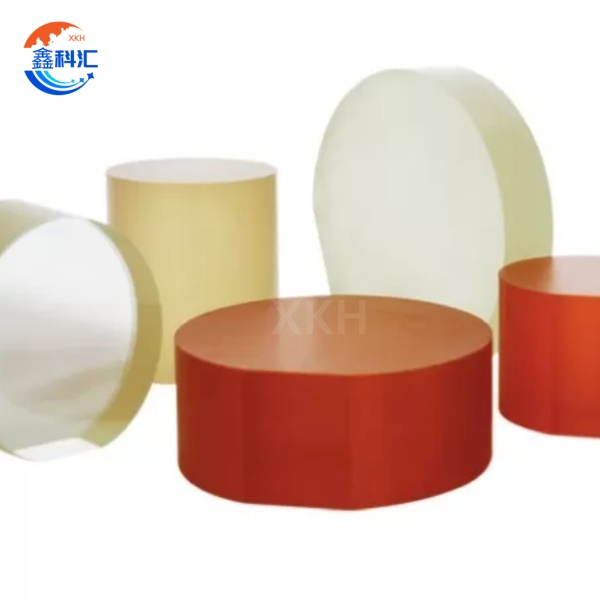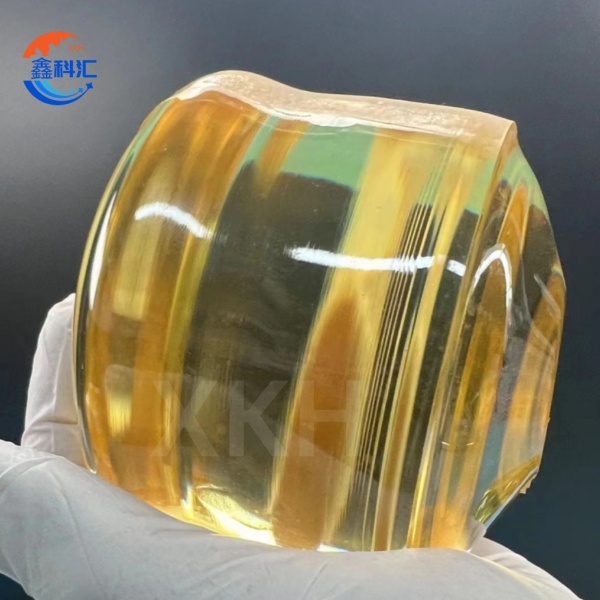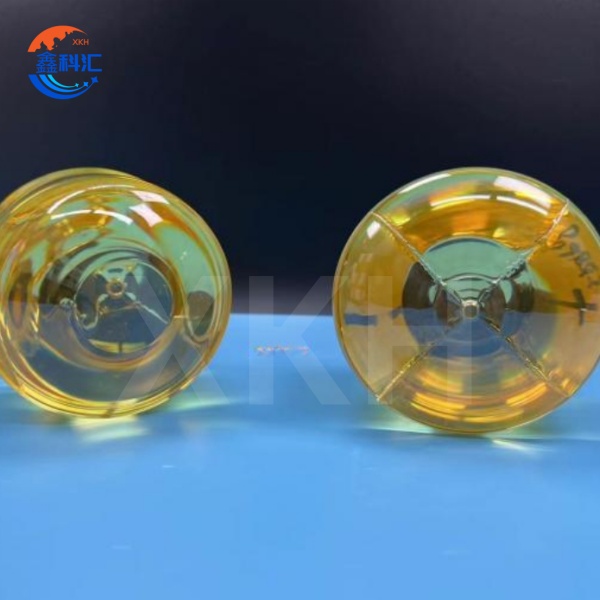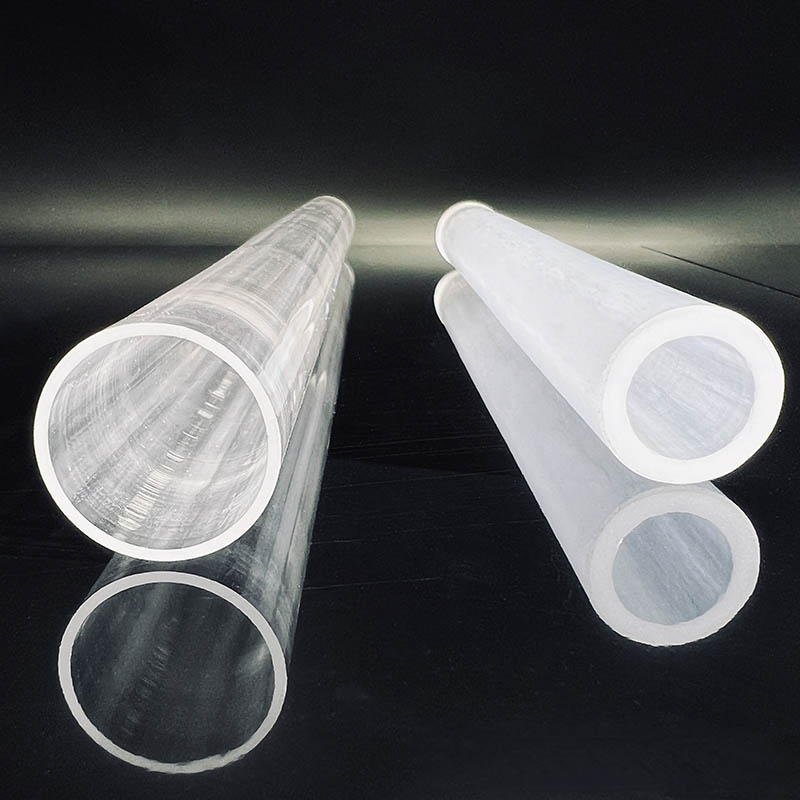Mg-Doped LiNbO₃Ingots 45°Z-Cut 64°Y-Cut Orientations For 5G/6G Communication Systems
Technical parameters
| Crystal structure | Hexagonal |
| Lattice constant | a = 5.154 Å c = 13.783 Å |
| Mp | 1650 o C |
| Density | 7.45 g / cm3 |
| Curie temperature | 610 o C |
| Hardness | 5.5 - 6 Mohs |
| Thermal expansion coefficient | aa = 1.61 x 10 -6 / k ac = 4.1 x 10 -6 / k |
| Resistivity | 1015 Wm |
| Permittivity | es11 / e0: 39 ~ 43 es33 / e0: 42 ~ 43 et11 / e0: 51 ~ 54 et11 / e0: 43 ~ 46 |
| Color | Colorless |
| Through a range of | 0.4 ~ 5.0 um |
| Index of refraction | n o = 2.176 n e = 2.180 @ 633 nm |
Key Technical Characteristics
LiNbO3 Ingot exhibits a suite of superior properties:
1. Electro-Optic Performance:
High Nonlinear Coefficient: d₃₃= 34.4 pm/V, enabling efficient second harmonic generation (SHG) and optical parametric oscillation (OPO) for tunable infrared sources .
Broadband Transmission: Minimal absorption in the visible spectrum (α < 0.1 dB/cm at 1550 nm), critical for C-band optical amplifiers and quantum frequency conversion .
2. Mechanical & Thermal Robustness:
Low Thermal Expansion: CTE = 14.4×10⁻⁶/K (a-axis), ensuring compatibility with silicon substrates in hybrid photonic circuits .
High Piezoelectric Response: g₃₃> 20 mV/m, ideal for surface acoustic wave (SAW) filters in 5G mmWave systems .
3. Defect Control:
Micropipe Density: <0.1 cm⁻²(8-inch ingots), validated via synchrotron X-ray diffraction .
Radiation Resistance: Minimal lattice distortion under 100 kV/cm electric fields, validated in aerospace-grade testing .
Strategic Applications
LiNbO3 Ingotdrives innovation across cutting-edge domains:
1. Quantum Photonics:
Single-Photon Sources: Leveraging nonlinear down-conversion, LiNbO3 enables entangled photon pair generation for quantum key distribution (QKD) systems .
Quantum Memory: Integration with Er³⁺-doped fibersachieves 30% storage efficiency at 1530 nm, critical for long-distance quantum networks .
2. Optoelectronic Systems:
High-Speed Modulators: X-cut LiNbO3 achieves 40 GHz bandwidth with <1 dB insertion loss, outperforming LiTaO3 in 400G optical transceivers .
Laser Frequency Doubling: Mg-doped LiNbO3 (6% threshold) reduces photorefractive damage, enabling stable 1064 nm → 532 nm conversion in LiDAR systems .
3. Industrial Sensing:
High-Temperature Pressure Sensors: Operate continuously at 600°C, leveraging piezoelectric resonance for oil/gas pipeline monitoring .
Current Transformers: Fe/Mg co-doping enhances sensitivity (0.1% FS) in smart grid applications .
XKH Services & Solutions
Our LiNbO3 Ingot services are engineered for scalability and precision:
1. Custom Fabrication:
Size Options: 3–8-inch ingots with X/Y/Z-cut and 42°Y-cut geometries, ±0.01° angular tolerance .
Doping Control: Fe/Mg co-doping via Czochralski method (concentration range 10¹⁶–10¹⁹ cm⁻³) to optimize photorefractive resistance .
2. Advanced Processing:
Heterogeneous Integration: Si-LN composite wafers (300–600 nm thickness) with thermal conductivity up to 8.78 W/m·K for high-frequency SAW filters .
Waveguide Fabrication: Proton exchange (PE) and reverse proton exchange (RPE) techniques yield submicron waveguides (Δn >0.7) for 40 GHz electro-optic modulators .
3. Quality Assurance:
End-to-End Testing: Raman spectroscopy (polytype verification), XRD (crystallinity), and AFM (surface morphology) ensure compliance with MIL-PRF-4520J and JEDEC-033 .
Global Logistics: Temperature-controlled shipping (±0.5°C) and 48-hour emergency delivery across Asia-Pacific, Europe, and North America .
Competitive Advantages
1. Cost Efficiency: 8-inch ingots reduce material waste by 30% compared to 4-inch alternatives, lowering per-unit costs by 18% .
2. Performance Metrics:
SAW Filter Bandwidth: >1.28 GHz (vs. 0.8 GHz for LiTaO3), critical for 5G mmWave bands .
Thermal Cycling: Survives -200–500°C cycles with <0.05% warpage, validated in automotive LiDAR testing .
1. Sustainability: Recyclable processing methods reduce water consumption by 40% and energy use by 25%.
Conclusion
LiNbO3 Ingot remains the material of choice for next-generation optoelectronics, combining unmatched electro-optic performance with industrial-grade reliability. From quantum computing to 6G communications, its versatility and scalability position it as a critical enabler of future technologies. Partner with us to leverage cutting-edge doping, defect mitigation, and heterogeneous integration solutions tailored to your application needs.












